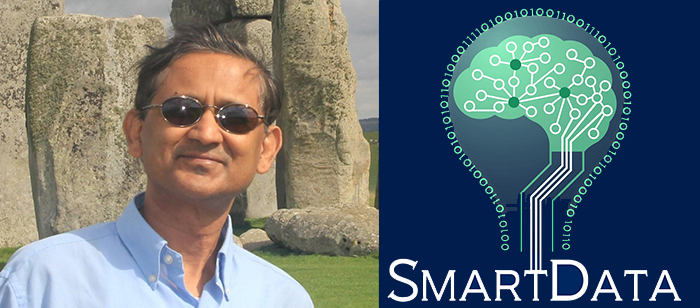
Transforming big data into smart data:
deriving value via harnessing volume, variety
and velocity using semantics and semantic web
Professor Amit Sheth
Wright State University
11:00am Tuesday, 26 May 2015, ITE 325, UMBC
deriving value via harnessing volume, variety
and velocity using semantics and semantic web
Wright State University
Big Data has captured a lot of interest in industry, with the emphasis on the challenges of the four Vs of Big Data: Volume, Variety, Velocity, and Veracity, and their applications to drive value for businesses. In this talk, I will describe Smart Data that is realized by extracting value from Big Data, to benefit not just large companies but each individual. If my child is an asthma patient, for all the data relevant to my child with the four V-challenges, what I care about is simply, "How is her current health, and what are the risk of having an asthma attack in her current situation (now and today), especially if that risk has changed?" As I will show, Smart Data that gives such personalized and actionable information will need to utilize multimodal data and their metadata, use domain specific knowledge, employ semantics and intelligent processing, and go beyond traditional reliance on Machine Learning and NLP. I will motivate the need for a synergistic combination of techniques similar to the close interworking of the top brain and the bottom brain in the cognitive models. I will present a couple of Smart Data applications in development at Kno.e.sis from the domains of personalized health, health informatics, social data for social good, energy, disaster response, and smart city.
Amit Sheth is an Educator, Researcher and Entrepreneur. He is the LexisNexis Ohio Eminent Scholar, an IEEE Fellow, and the executive director of Kno.e.sis – the Ohio Center of Excellence in Knowledge-enabled Computing a Wright State University. In World Wide Web (WWW), it is placed among the top ten universities in the world based on 10-year impact. Prof. Sheth is a well cited computer scientists (h-index = 87, >30,000 citations), and appears among top 1-3 authors in World Wide Web (Microsoft Academic Search). He has founded two companies, and several commercial products and deployed systems have resulted from his research. His students are exceptionally successful; ten out of 18 past PhD students have 1,000+ citations each.
Host: Yelena Yesha, yeyesha2umbc.edu